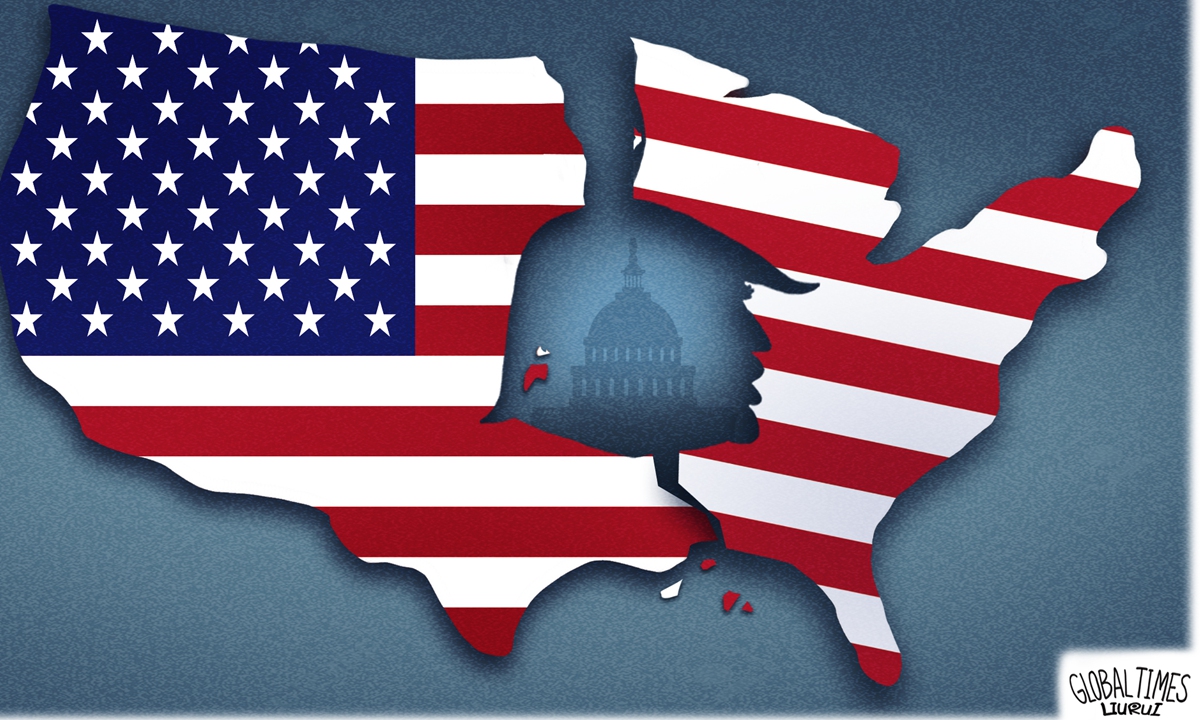
Trump's "Divided States of America" Cartoon:Liu Rui/GT
Political elites from many countries have conveyed their concerns and condemnation toward the Capitol riots taking place in Washington DC last week. Two main narratives about this have drawn widespread attention.
One is from former Soviet Union leader Mikhail Gorbachev. He said on January 7 in an interview with Moscow-based news agency Interfax that the events called into question the US' continued existence as a nation. Some media outlets interpreted it as Gorbachev believing the US will follow the path of the Soviet Union to disintegrate.
Another one comes from former foreign secretary of the UK, David Miliband. In an op-ed article published on the Daily Mail on Sunday, he wrote that Balkanization is the danger the US is facing today.
The rhetoric from both Miliband and Gorbachev sounds alarmist. The current situation in the US is far from "Balkanization" or collapse. Admittedly, the Capitol riots illuminate how grave the polarization and bipartisan rivalry are in the US, which has gone beyond international community's prior anticipation with its unprecedented violence. Whereas US' grave social divisions cannot be bridged in a short term, bipartisan rivalry will continue and possibly escalate in the future.
However, when the riots took place in Washington DC, political elites, including many supporters of President Donald Trump, remained on the same page to denounce such violence. Indeed, the majority of the public denounced it too. This domestic stance guarantees that the events will not further ferment or deteriorate into a large-scale disorder out of this.
Actually, social division and class antagonism in this country have been mounting for many years, but had not exposed in the form of such right-wing violence. If these problems cannot be properly tackled, the possibility that more extreme events will take place in the future cannot be ruled out. Some may even be bloodier than the Capitol riots. It remains to be seen whether or not the current or future mechanisms in the US will make sure such violence does not happen again. It is also not clear if incoming president Joe Biden can take effective measures to alleviate the severe social divisions and bipartisan rivalry that are tearing the country apart.
Although Gorbachev's view bears some semblance of Miliband's, their positions seems to be different. During the Cold War, the US and the Soviet Union contended for hegemony and saw each other as their biggest foe. As the last top leader of the Soviet Union, Gorbachev may hope to see the US follow the Soviet's path, for whatever reason. Despite some similarities between the situations in the US at present and in the former Soviet Union before it collapsed, these irreconcilable social divisions and class confrontations have huge divergences.
Before the disintegration, the former Soviet Union's communist party lost nearly all popularity among the public. The majority in the Soviet Union doubted or even rebelled at their political system. They believed the collapse of the Soviet Union would be positive.
On the contrary, although many Americans have lost confidence in their polarizing partisanship and political establishment, it has not gone as far as the situation of the Soviet Union before its dissolution.
The whole international community has expressed their great concerns over what happened at the Capitol Hill last week. In terms of Miliband's opinion of "Balkanization," he is more likely to warn Washington not to repeat such riots. He was not mocking the US. Because although the US' global leadership is declining, most US allies, including the UK, still see it as their leading "big brother." And they are willing to rely on the US to guide them in dealing with many global affairs. In spite of repeated spats, they are reluctant to see similar riots occur ever again in Washington.
The author is deputy director of the Center for American Studies at Fudan University. opinion@globaltimes.com.cn




